
For Akhilesh Yadav, this by-election provides a chance to show that the SP’s Lok Sabha performance wasn’t a fluke.
Credit: PTI Photo
Any election in Uttar Pradesh resonates across India’s political landscape, and the upcoming by-elections for nine Assembly seats in the state are no exception. UP not only contributes significantly to the Lok Sabha but also shapes the national narrative through the messaging embedded in its elections. Although these are by-elections, the outcomes will likely ripple through UP’s governance and national politics.
For the ruling Bharatiya Janata Party (BJP) and Chief Minister Yogi Adityanath the stakes are especially high. The BJP’s performance in the Lok Sabha elections fell short of expectations, as the opposition I.N.D.I.A. bloc made substantial gains, winning 43 of UP’s 80 seats, leaving the BJP-led National Democratic Alliance (NDA) with just 36.
This result was surprising, especially since UP has been a stronghold for the BJP's Hindutva agenda. The loss of the Faizabad constituency, including Ayodhya — a symbolic seat due to the Ram temple — was a particular setback for Adityanath, whose leadership is under scrutiny from within the party. Adityanath’s aggressive campaigning in these by-elections indicates both his commitment to regain momentum and the pressure he faces to deliver.
For Samajwadi Party (SP) leader Akhilesh Yadav, this by-election is equally pivotal. It provides a chance to show that the SP’s Lok Sabha performance wasn’t a fluke, reinforcing his role within the I.N.D.I.A. bloc. Notably, the Congress has refrained from contesting these bypolls, thereby sparing Yadav the headache of internal competition. This move not only sends a message of unity but underscores the I.N.D.I.A. bloc’s dependence on the SP’s continued strength. A strong showing would bolster Yadav’s standing within both state and national politics.
For the I.N.D.I.A. bloc, these bypolls are a critical experiment in Dalit representation. In Ghaziabad, an urban BJP stronghold, the SP has made an unconventional choice by fielding a Dalit candidate, diverging from the area’s typical trend of upper-caste contenders. Since 1991, the BJP has dominated Ghaziabad, winning six times, while the Congress, the Bahujan Samaj Party, and the SP have each won just once.
Yadav appears to be replicating a successful strategy from the recent Lok Sabha elections, where the party fielded Dalit candidates in key seats like Meerut and Faizabad. While the SP narrowly lost in Meerut, it won Faizabad. If this strategy succeeds in Ghaziabad, it could strengthen I.N.D.I.A. bloc’s inclusive approach that may resonate deeply with UP’s diverse electorate ahead of 2027 Assembly polls.
The SP has placed significant focus on caste diversity through its Pichde Dalit Alpsankhyak (PDA) strategy, which emphasises unity among backward castes, the Dalits, and minorities. This approach is mirrored in its candidate lineup: two Dalits, four Muslims, and three candidates from Other Backward Castes (OBCs).
Prominent figures include Jyoti Bind in Majhawan, the daughter of former BSP MLA Ramesh Bind, and Shobawati Verma in Katehari, wife of SP MP Lalji Verma, both non-Yadav OBCs, aiming to expand SP’s reach within diverse caste groups. Meanwhile, in Karhal, Akhilesh Yadav’s nephew Tej Pratap Yadav is running, underscoring SP’s emphasis on influential family ties. This combination of broad representation and strategic placements is intended to enhance the SP’s appeal across key UP constituencies.
The UP bypolls may significantly influence Muslim representation in the Assembly, enhancing the I.N.D.I.A. bloc’s appeal among Muslim voters. With Muslims making up nearly 20% of UP’s population, their representation in the Assembly is notably low — currently only 31 out of 403 MLAs (7.7%), with 27 from the SP. Aiming to expand its support, the SP is fielding four Muslim candidates. This strategy underscores its commitment to inclusivity.
Whoever wins these bypolls will get a fillip and will be a significant morale booster, setting the stage for the 2027 Assembly polls. A win for the SP buttresses its case as a viable alternative to the BJP in the state. It will also elevate the SP’s position within the I.N.D.I.A. bloc. A BJP win will help Adityanath fend off criticism within the party.
It might be the by-election to just nine of the 403 Assembly seats — but its results surely carry a much bigger significance in national politics.
Sayantan Ghosh is a research scholar and teaches journalism at St. Xavier’s College (autonomous), Kolkata. X: @sayantan_gh.
Disclaimer: The views expressed above are the author's own. They do not necessarily reflect the views of DH.